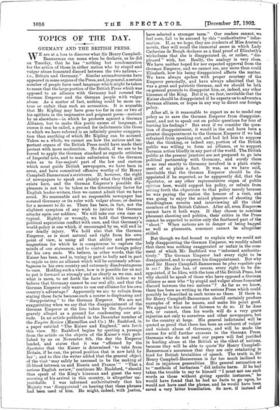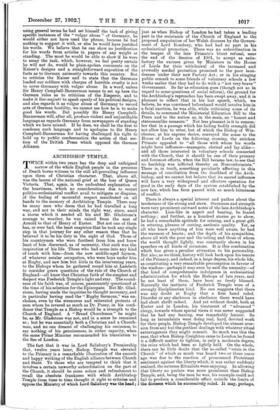TOPICS OF THE DAY.
GERMANY AND THE BRITISH PRESS. NvE are at a loss to discover what Sir Henry Campbell- Bannerman can mean when he declares, as he did on Tuesday, that he has "nothing but condemnation for the action of those in either nation who by stupid and vulgar abuse fomented discord between the two nations,- i.e., Britain and Germany." Similar animadversions have appeared in some organs of the Press, and, in general, a certain number of people have used language which might betaken to mean that the large portion of the British Press which was opposed to an alliance with Germany had covered the German Emperor and the German people with vulgar abuse. As a matter of fact, nothing could be more un- true or unfair than such an accusation. It is arguable that Mr. Kipling may have gone too far in one or two of his epithets in the impressive and poignant poem—noticed by us elsewhere—in which he protests against a German Alliance, but to make this poetic excess of language, if excess it can be called, a ground for indictments like those to which we have referred is an infinitely greater exaggera- tion than anything of which Mr. Kipling can be accused. Taken as a whole, we cannot see how the serious and im- portant organs of the British Press could have made their protest with more moderation. No doubt, if we are to be forced to apply the German standard as regards criticism of Imperial acts, and to make submission to the German rules as to lese-majeste part of the law and custom which must guide British newspapers, we have been in error, and have committed offences worthy of Sir Henry Campbell-Ba.nnerman's strictures. If, however, the right of newspapers to speak out plainly what they think still exists here, and the German Emperor's possible dis- pleasure is not to be taken as the determining factor for English leader-writers, then we cannot admit that we have erred. No reasonable and no responsible newspaper has covered Germany or its ruler with vulgar abuse, or desires for a moment to do so. There has been, in fact, not the slightest symptom of any wish to imitate the German attacks upon our soldiers. We will take our own case as typical. Rightly or wrongly, we hold that Germany's political aspirations conflict with ours, and that Germany's world-policy is one which, if encouraged by us, will end in our deadly injury. We hold also that the German Emperor, as is most natural and right from his own point of view, is using all that ability and personal magnetism for which he is conspicuous to capture the minds of our statesmen, and to control our foreign policy for his own ends. We believe, in other words, that the Kaiser has been, and is, trying in part to bully and in part to cajole us into an alliance which will be extremely advan- tageous to his own country and extremely disadvantageous to ours. Holding such a view, how is it possible for us not to put it forward as strongly and as clearly as we can, and what is more, to set forth the facts which induce us to believe that Germany cannot be our real ally, and that the German Emperor only wants to use our alliance for his own country's advantage ? Apparently we are to refrain from stating these facts because such a course is displeasing and " disappointing " to the German Emperor. We are not exaggerating when we say that the disappointment of the German Emperor at the line taken by the Spectator is gravely alleged as a ground for condemning our atti- tude. In an article published in the December number of the Empire Review (Macmillan and (Jo.) Mr. Bashford, in a paper entitled "The Kaiser and England," sets forth this view. Mr. Bashford begins by quoting a passage • from the article on the objects of the Kaiser's visit pub- lished by us on November 8th, the day the Emperor landed, and states that it was "affirmed by the • Spectator that the Kaiser is determined to take from Britain, if he can, the proud position that is now held by her ' ; and to this the writer added that the general object of the visit may safely be assumed to be the making of ill-blood between us and Russia and France.'" "That a serious English review," continues Mr. Bashford, "should thus speak of the King's kinsman and guest the very morning of his arrival in this country, is altogether un- justifiable. I was informed authoritatively that his Majesty was ' disappointed ' on hearing that these phrases had been used of him. He might, indeed, with justice, have selected a stronger term." Our readers cannot, we feel sure, fail to be amused by this " authoritative " infor- mation. If, as we hope, they are students of Miss Austen's novels, they will recall the immortal scene in which Lady Catherine de Burgh declares as .a final proof of Elizabeth's wickedness that she is disappointed in, or rather, "lis pleased" with, her. Really, the analogy is very close. We have neither hoped for nor expected approval from the German Emperor, and we cannot see, any more than could Elizabeth, how his being disappointed affects the matter. We have always spoken with proper courtesy of the Emperor personally, and have always admitted that he was a great and patriotic German, and we should be loth on general grounds to disappoint him, or, indeed, any other kinsman of the King. But it is, we fear, inevitable that the Kaiser should be disappointed if he expects us to advocate a German alliance, or hopes in any way to direct our foreign policy.
After all, is it reasonable to expect us so to model our policy as to save the German Emperor from disappoint- ment, and not to speak out on public questions for fear of hurting his feelings ? But even if we consider the ques- tion of disappointment, it would in the end have been a greater disappointment to the German Emperor if we had refrained from speaking out, and had led him to suppose that the thinking, or indeed any, portion of the British public was willing to form an alliance, or to support German action blindly in any part of the world. The British public at the present juncture are not prepared to go into political partnership with Germany, and surely there is no real enmity to Germany involved in a plain state- ment of so plain a fact. It was, as we have said, inevitable that the German Emperor should be dis- appointed if he expected, as he apparently did, that the Spectator, or any other representative organ of public opinion here, would support his policy, or refrain from setting forth the objections to that policy merely because he was paying the nation the honour of a visit, and. was going to enjoy the mixed pleasure of shooting the Sandringham coverts and interviewing all the chief members of the British Cabinet. After all, even Emperors cannot have it both ways. If they choose to combine pheasant shooting and politics, their critics in the Press cannot be expected to notice only the feathered part of the "shoot." When nations are in danger of being bagged as well as pheasants, comment cannot be altogether stilled.
But though we feel bound to explain why we could not help disappointing the German Emperor, we readily admit that there was nothing exaggerated or unfair in the com- ment of which Mr. Bashford was "informed authorita- tively." The German Emperor had every right to be disappointed, and to express his disappointment. But why need Sir Henry Campbell-Bannerman be plus royaliste qua le roil He also has, of course, every right to be dis- appointed, if he likes, with the tone of the British Press, but why should he speak of those who have opposed a German alliance as men who "by stupid and vulgar abuse fomented discord between the two nations"? As far as we know, there has been no writing in the serious Press which could possibly be described in such terms as these. If there is, Sir Henry Campbell-Bannerman should certainly produce examples of what he means, and make his point good. We appeal to his sense of fairness to do so. If he does not, or cannot, then his words will do a very grave injustice not only to ourselves and other newspapers, but to the country at large. His general indictment will be quoted as proof that there has been an outburst of vulgar and violent abuse of Germany, and will be made the excuse for still further excesses in the German Press. Germans who do not read our papers will feel justified in hurling abuse at the British as the vilest of nations, because they will be able to quote'Sir Henry Campbell- Bannerman's assurance that they are only retaliating in kind for British brutalities of speech. The truth is, Sir Henry Campbell-Bannerman is far too much inclined to deal in injurious generalities. His general accusation.as to "methods of barbarism" did infinite harm. If he had taken the trouble to say to himself " I must not use such words as those without giving specific instances," he would have found that he had no facts to go upon, he would not have used the phrase, and he would have been saved a very bitter humiliation. So now, if instead of using general terms he had set himself the task of giving specific instances of the "vulgar abuse" of Germany, he would either not have used the phrase, because he had nothing to support it with, or else he would have justified his words. We believe that he can show no justification for his words from articles in papers of any weight or standing. The most he would be able to show if he were to essay the task, which, however, we feel pretty certain he will not do, would be plain-spoken comments on the Kaiser's designs and. a straightforward exposition of the facts as to German animosity towards this country. But to criticise the Kaiser and to state that the Germans loaded our soldiers with charges of horrible cruelty is not to cover Germany with vulgar abuse. In a word, unless Sir Henry Campbell-Bannerman means to set up here the German rules as to criticism of the Emperor, and to make it lese-majeate to speak openly of his political designs, and also regards it as vulgar abuse of Germany to record acts of German hostility, we cannot see how he is to make good. his words. But possibly Sir Henry Campbell- Bannerman will, after all, produce violent and unjustifiable language as regards Germany from newspapers of standing which we have missed. If he does, we shall be the first to condemn such language and to apologise to Sir Henry Campbell-Bannerman for having challenged his right to hold up to public condemnation the action of that sec- tion of the British Press which opposed the German Alliance.







































 Previous page
Previous page